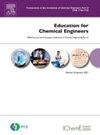对分享工具的评论:捏点分析基于挑战的学习
IF 2.3
2区 教育学
Q1 EDUCATION, SCIENTIFIC DISCIPLINES
引用次数: 0
摘要
本评论讨论了J. C. Antonwu的工业过程中夹点分析和热交换器/热泵集成模拟工具的教育工具:基于挑战的学习中的开发和应用,其中共享了带有注释的Python脚本以解决过程集成问题。本文章由计算机程序翻译,如有差异,请以英文原文为准。
Critique on Tools for sharing: Pinch analysis challenge-based learning
This critique discusses the educational tools of A Simulation Tool for Pinch Analysis and Heat Exchanger/Heat Pump Integration in Industrial Processes: development and Application in Challenge-based Learning by J. C. Antonwu, in which a Python script with comments is shared to solve process integration problems.
求助全文
通过发布文献求助,成功后即可免费获取论文全文。
去求助
来源期刊

Education for Chemical Engineers
Multiple-
CiteScore
8.80
自引率
17.90%
发文量
30
审稿时长
31 days
期刊介绍:
Education for Chemical Engineers was launched in 2006 with a remit to publisheducation research papers, resource reviews and teaching and learning notes. ECE is targeted at chemical engineering academics and educators, discussing the ongoingchanges and development in chemical engineering education. This international title publishes papers from around the world, creating a global network of chemical engineering academics. Papers demonstrating how educational research results can be applied to chemical engineering education are particularly welcome, as are the accounts of research work that brings new perspectives to established principles, highlighting unsolved problems or indicating direction for future research relevant to chemical engineering education. Core topic areas: -Assessment- Accreditation- Curriculum development and transformation- Design- Diversity- Distance education-- E-learning Entrepreneurship programs- Industry-academic linkages- Benchmarking- Lifelong learning- Multidisciplinary programs- Outreach from kindergarten to high school programs- Student recruitment and retention and transition programs- New technology- Problem-based learning- Social responsibility and professionalism- Teamwork- Web-based learning
 求助内容:
求助内容: 应助结果提醒方式:
应助结果提醒方式:


